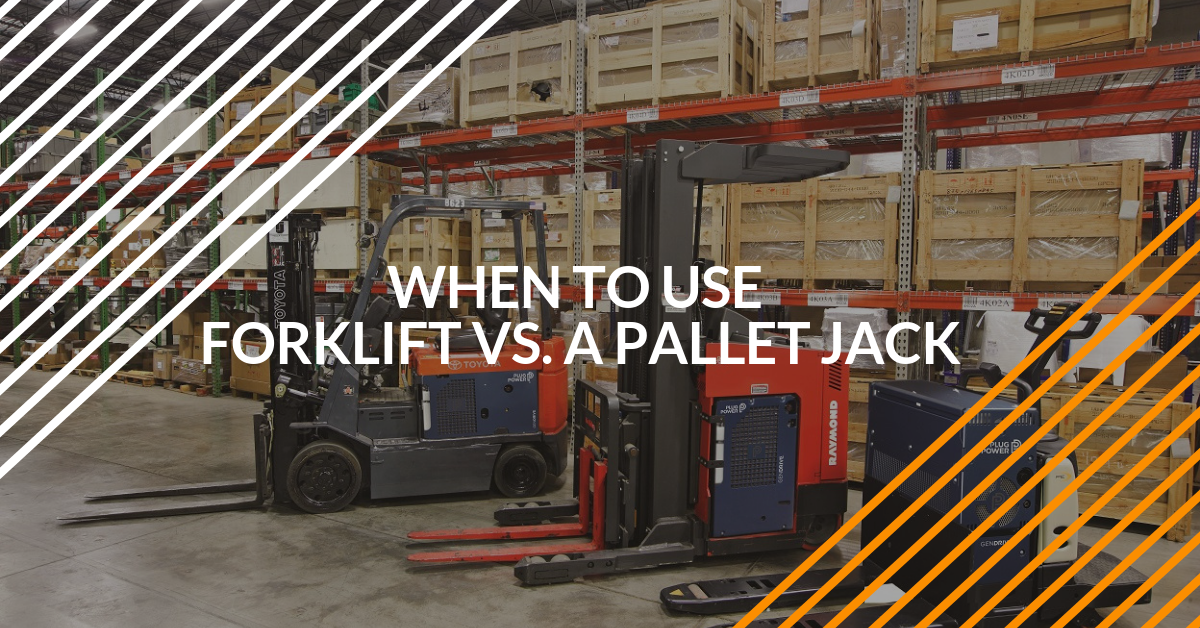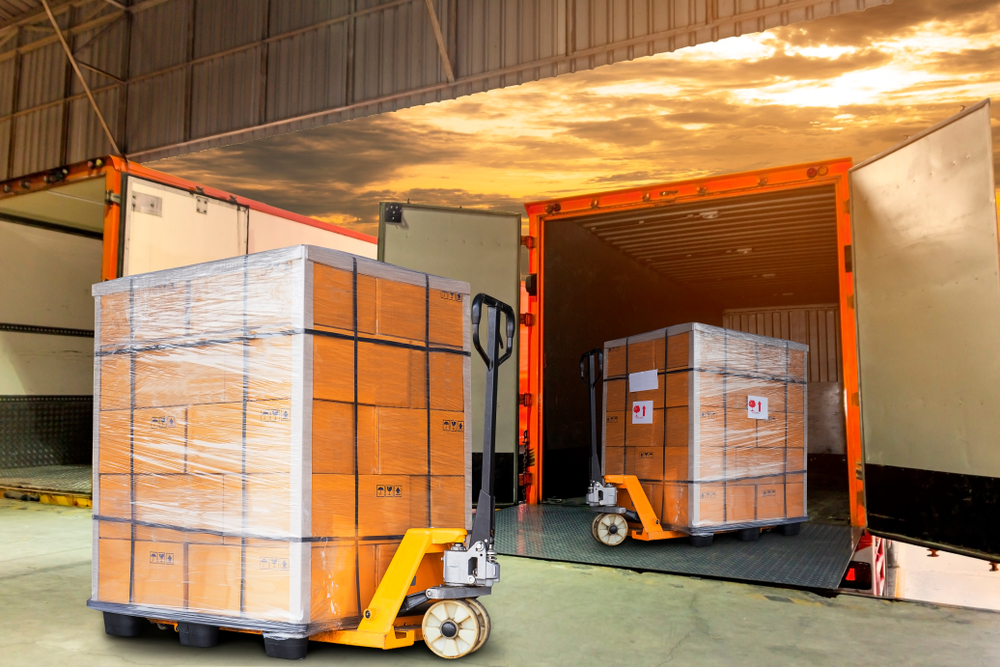The Benefits of Forklifts vs Pallet Jacks
Which is better: a pallet jack or a forklift? The pallet jack vs. forklift debate is ongoing, but it is important to note that both have their respective pros and cons. Like with most machines, your end goal should largely dictate which tool you decide to use. Understanding the unique requirements for a job can help guide your choice. Both forklifts and pallet jacks are excellent resources to have on hand, but their practical applications can vary widely.
Regardless of whether you decide to use a pallet jack or a forklift on the job, you’ll need to be fully trained and licensed before getting to work. The Occupational Health and Safety Administration has strict requirements for pallet jack and forklift operators, so it’s important to always be in alignment with their standards. Thankfully, earning your license is easier than ever – online forklift and pallet jack training with ForkliftCertification.com makes learning simple.
The Difference Between a Pallet Jack and a Forklift

When comparing pallet jacks vs. forklifts, scale matters. Forklifts are larger, and have more lifting, loading, and moving capabilities than pallet jacks Because of their ability to extend vertically, they’re used to stack and retrieve loads of heavy goods. As the workhorse of material handling, forklifts perform a variety of indoor and outdoor functions, which include:
✓ Lifting and moving inventory and materials
✓ Loading items onto trucks for transporting them and unloading trucks when shipments are received
✓ Lifting workers to carry out overhead tasks
✓ Loading and unloading ships, trains and railroad cars
✓ Specialty jobs, such as wet or dry sweeping of warehouse and dock floors
Forklifts are much bigger than pallet jacks, which allows them to lift heavier loads and move more materials at one time. Their ability to reach high shelves for placing or retrieving goods means more efficient use of warehouse space. Forklifts are also good at moving heavy pallet loads through narrow aisles and around tight corners.
Forklifts are the best choice for lifting large, heavy loads to spots high overhead. They’re also good when lifting loads of different sizes. If your company handles materials outdoors, a forklift’s sturdy wheels and power capabilities make it safer and easier to work on rough terrain. In warehouses where heavy products are stored on high racks or shelves, a forklift may be the only material handling equipment you need.
Is a pallet jack a forklift? This question is frequently posed when comparing forklift vs pallet jacks. When compared to forklifts, pallet jacks are much smaller and simpler material handling machines. They’re designed for moving pallet-sized loads through a warehouse. Pallet jacks can carry a maximum weight of 3,500 kg (7,717 lbs.), and come in both hand pumped or powered models. The main difference between the two is the ease of using a powered jack and the cost of the equipment.
To operate a pallet jack, a worker stands either on the ground directly behind the lift or on its forks or footings. The worker slides the forks underneath the pallet before lifting, then pumps the handle to raise the forks and pallets off the ground. The final step is to transport the load to where it needs to be. Forklifts can move and lift loads to high areas, while pallet jacks are designed to raise the forks just far enough above
Advantages And Disadvantages Of Forklifts
A forklift is a great option for those who require maximum height and load capacity. It can be easy to maneuver, and operators typically won’t have to worry about fatigue if they use a lift for an extended period of time.
Cost can be prohibitive, though, especially when comparing pallet jacks vs forklifts. A new forklift usually costs anywhere from $20,000 to $50,000. Ongoing maintenance is also required to keep a lift running at peak levels. These expenses must be factored into your decision between a forklift vs pallet jack.
If you are considering a forklift, consider why you need a lift in the first place before you purchase one. Those who know how a forklift is used in a warehouse or other industrial work environments can determine if a lift is the best option.
Pallet Jack Advantages And Disadvantages
There are a number of exciting advantages associated with pallet jacks. They never need to be fueled or recharged, and can be stored in small spaces. They’re versatile, too – a pallet jack can move pallet loads just far enough above the surface to glide over smooth concrete floors. Affordable, durable, and easy to maneuver, pallet jacks are undeniably useful. It’s important to keep these advantages in mind when deciding between a forklift vs. pallet jack.
Of course, there are some drawbacks associated with pallet jacks, too. They’re limited in their ability to handle heavy loads. They don’t perform well on rough terrain, and while they can be quite versatile machines, they often pale in comparison with forklifts. If you’re hoping to lift large loads in an outdoor setting, a forklift is probably the better choice. If you’re moving smaller loads in a warehouse setting, though, both a forklift and pallet jack can get the job done.
The Easiest And Best Way To Get Forklift And Pallet Jack Training
Deciding between a pallet jack vs forklift can be challenging. The right choice can mean improved workplace safety and productivity, and a reduction in the time needed to complete tasks. This lowers the overall cost of operations. Regardless of the type of lift you use in your business, OSHA requires all operators, including pallet jack operators, to be properly trained and certified before your workers can use them.
Proper training can make all the difference in terms of safety and productivity. Forklift and pallet jack training can help reduce accidents and improve overall workplace safety. OSHA studies indicate operator error is the number one cause behind most forklift accidents. That’s why training is so essential.
Our complete Training Kit costs just $299 and covers everything your workers need to know about operating forklifts and pallet jacks in one easy-to-use program. Our online training is 100% OSHA-compliant and takes only about an hour to complete. Your workers can take the training using a smartphone or other digital device any time that’s convenient and anywhere there’s an internet connection, so there’s no need for them to spend time away from work traveling to and from an offsite training facility.
In less than an afternoon, your workers can complete forklift and pallet jack training and receive their pallet jack forklift certifications, so why wait – enroll them today!
Frequently Asked Questions About Forklifts vs. Pallet Jacks
Still need more information about the benefits of forklifts vs. pallet jacks? Below are some questions we’re frequently asked, along with our responses.
What Class is a Pallet Jack?
Understanding the difference between electric forklifts vs. pallet jacks often comes down to understanding their classes. Both types of machines are Class II equipment. More alike than they are different, forklifts and pallet jacks both come in rider and walk behind models. It’s what makes them so useful for unloading cargo, moving loads to a staging area, and transporting small loads over short distances.
Does OSHA Require Pallet Jack Training?
OSHA requires all operators to have their pallet jack forklift certification before using these machines. Fail to earn your certification in advance of starting work and your organization could be liable for expensive penalties and fines. It is the obligation of the employer to ensure that workers are trained and certified every three years. Education and certification can also go a long way in preventing workplace accidents and injuries.
Is a Pallet Jack a Forklift?
Is a pallet jack a forklift? It’s a question we’re asked quite frequently. According to OSHA, pallet jacks, which are also known as pallet trucks, pump trucks or scooters, are the most basic type of forklift, and as such, pallet jack workers need to be properly trained and certified to use them.
Do Pallet Jacks Have Brakes?
Although there are pallet jacks equipped with brakes, most basic models, known as hand pumps, usually don’t. The forks are raised by the operator manually pumping the hydraulic system. When it’s time to place the load, there’s normally a small lever on the steering tiller to release the hydraulic fluid and lower the forks. There are, however, electrically powered pallet jacks that can only be slowed or stopped by reversing the throttle, while others have a “dead man’s switch” that stops the lift. Keep this in mind when choosing between electric pallet jacks vs forklifts.
Can a Pallet Jack be Used to Lift a Car?
A pallet jack can be used to lift a car. To do so, a pallet jack operator must proceed cautiously to avoid damaging the jack or the car or putting others in danger. Pallet jacks are generally not used to lift cars in garages and other automotive facilities. For those who want to lift a car using a pallet jack, they should take appropriate safety measures to avoid putting themselves or others at risk.
Do You Need a License to Operate a Pallet Jack?
Yes. OSHA’s requirement for training and certifying lift equipment operators extends to persons who work with pallet jacks. The good news is that once you’ve earned your pallet jack forklift certification, it’s good for three years.
What is the Life Expectancy of a Forklift?
As with most things in life, you get what you pay for, and forklifts are no exception. The average forklift has a useful lifespan of 10,000 hours, and is operated 2,000 hours per year, which implies a lifespan of five years. Other factors determining a forklift’s life include the types of loads it typically carries and how well it’s maintained. Electrically powered forklifts normally outlast those with internal combustion engines.
Convenient Online Forklift and Pallet Jack Training
Have other questions about training requirements for your forklift and pallet jack operators? Still unsure about the differences between electric forklifts vs pallet jacks? Give us a call at (888) 278-8896 or click here to reach one of our OSHA experts online. If you’re ready to enroll your workers in an FLC training class, sign them up today! Thanks for visiting ForkliftCertification.com and considering us for all your forklift operator training and certification needs!

